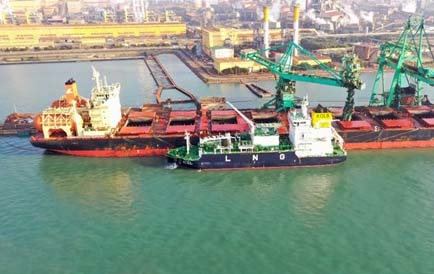Classification society Korean Register (KR) says that for the first time in Korea, simultaneous operations (Simops) of ship-to-ship LNG bunkering were successfully conducted for a coal-carrying bulk carrier at the Posco raw material dock, in Gwanyang port.
South Korea boasts prominent shipbuilding capabilities for LNG carriers and bunkering vessels; however, due to safety concerns, ship-to-ship LNG bunkering had never been carried out at the loading docks of its trading ports. To address these concerns, the Ministry of Oceans and Fisheries of Korea (MOF) initiated a plan to promote LNG bunkering operations. MOF is supporting R&D projects and LNG bunkering operators by providing port facility fee discounts, with the aim of ensuring the successful implementation of simultaneous LNG bunkering operations.
KR, together with the Korea Research Institute of Ships and Ocean Engineering (KRISO), has been actively conducting research and development (R&D) aimed at improving LNG bunkering safety technology, including the development of standard LNG bunkering operating procedures.
The initial operation was performed by Korea LNG Bunkering’s Blue Whale bunkering vessel and H-Line Shipping’s 179,000 dwt dual-fuel bulk carrier HL Eco.
KR says it plays a vital role as a member of an advisory group established by the MOF, along with other specialised organizations. This group assists the ministry in promptly reviewing and approving administrative procedures related to safety regulations, with the goal of reducing unnecessary obstacles and enhancing efficiency.
According to KR, while LNG has been widely chosen as an alternative fuel, the latest development is a significant step forward in the operation of LNG bunkering, and KR will continue to support the safe and successful implementation of simultaneous LNG bunkering operations.
MOF plans to expand the demonstration of bunkering with alternative marine fuels such as LNG and methanol at major Korean ports, including the Port of Busan, in order to develop Korea as a primary bunkering hub for alternative marine fuels by significantly easing bunkering safety regulations and taking measures to establish a sustainable alternative marine fuel supply chain under the guidance of specialist organisations such as KR.



